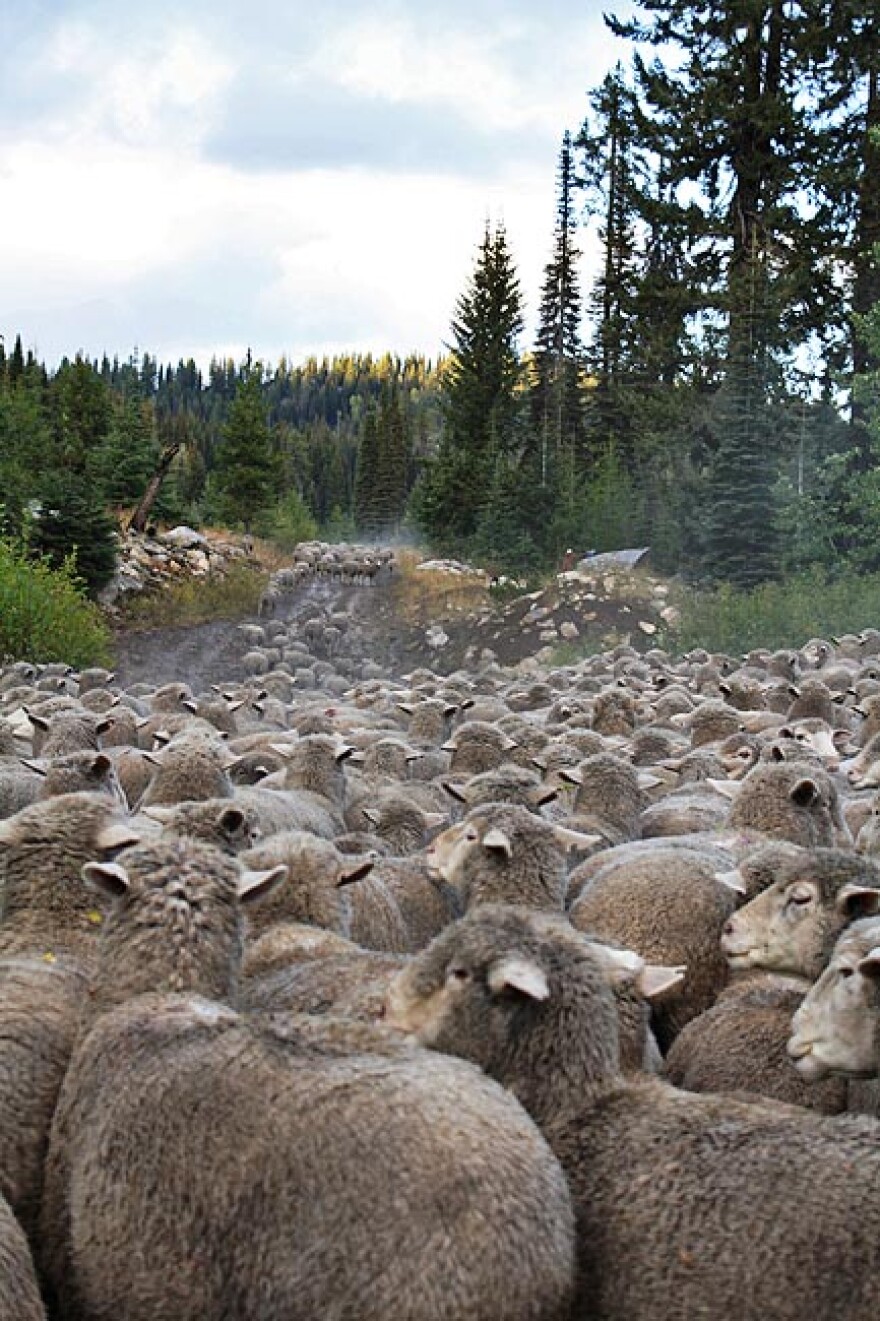

MCCALL, Idaho – The Spanish word for wolf is "lobo." That's a useful word to know for our next story. Many of the people who deal most closely with wolves are migrant workers from Peru and other Latin American countries. They're sheep herders. And they're changing the dynamics of wolf conflicts in the Northwest.
We're at nearly 6,000 feet in the mountains above McCall, Idaho. But the sheep -– they look like the sea. The band of 2,000 greyish animals flows and swells through the forest and the mud.
A herder named Nequar Pocomucha Huaroc gives a nod to the sky.
There's been a lot of rain lately, he says, even snow last night. Nequar has learned through experience that the damp weather tends to bring out the wolves.
Back at camp, Ruben Camayo Santiago prepares dinner. Like everything else here, the woodstove can fold up and be packed onto a horse each morning -– Ruben says they're always:
"Caminas caminas caminas."
Walking, walking, walking.
He pulls out his wallet. It holds: an Idaho ID, a Peruvian ID, and an international calling card. Ruben flips to the pictures of his children -– moments captured while he was in the US.
"Sometimes, seeing these photos of my kids, it's kind of sad," Ruben says. "They're still so young."
Since the 1950s, foreign herders have come to the West on three-year visas through a Department of Labor program. According to a typical job listing, herders are "on call for up to 24 hours per day, seven days per week, in all weather."
It's a 21st century description for an age-old profession.
"I mean if you go back to biblical times, you think about the shepherd standing out with the sheep at night," says Margaret Soulen Hinson, of the Soulen Livestock Company.
Lately, ranchers like her have a new problem. Or an old one, depending on how you look at it. In 1995 the federal government re-introduced wolves to Idaho. A few years later, the Soulens lost their first sheep to wolves.
They tried fencing, radio-activated alarms, noisy cracker shot fired from rifles. But then the Soulens hit on a low-tech solution. That worked.
"A bunch of us went out and we slept with the sheep every night. And by us being there, the wolves didn't come back in," Soulen Hinson says. "Humans are a big deterrent. So, if you can be there all the time..."
And she really means all the time. Herders are now constantly with the sheep, or within earshot. Suddenly, a lifestyle that hadn't changed much for decades shifted. Wolves mean more moving, says Ruben. And more sleepless nights.
"Before the year 2000, it was more relaxed. All you had to do was leave the sheep out in the field, and there weren't any problems," he explains. "Well, now you have to sleep close to the sheep, always waking up in the night, always worrying."
That's led Ruben and the other sheep herders to come up with a nickname for the wolves: "las terroristas" -– the terrorists.
"The wolves are not good. They can kill 40, 50, 60 sheep, but not eat them, just kill, kill, kill. When you have sheep die, it's very sad. And after a wolf has killed, he runs far away and howls. Like he wants to say, 'Ruben! I've now killed 40 sheep! Gracias!' I prefer the bears. The bears say, 'I'll just eat one, thanks.'"
But Ruben hasn't seen a night that bad in a while.
As the herders settle in for the night, they can sleep well knowing that Idaho ranches lost just 90 sheep to wolves this past season, according to the USDA. That's less than a third of the losses two years ago.
Todd Grimm is with the USDA's Wildlife Services Division.
"I would say absolutely they're working," he says. "It's not 100 percent effective, but it's getting better."
Yet the changes are also having the effect of making an already hard job even harder.
The pay for a herder in most states is around $750 a month. Oregon and California have pushed it to more than $1,000. But Colorado Mesa University professor Thomas Acker says widespread reform is needed in the work program.
Thomas Acker: "They are expected to care for horses, care for the sheep, apply medicine, splint broken legs, be handy with a rifle, they need to be good outdoorsmen and be able to orient themselves well in difficult if not impossible terrain ... and this is all listed as 'unskilled labor,'" Acker says.
Lawsuits over working conditions for the herders are popping up against some ranchers – including one in Yakima, Wash. And positions are getting harder to fill, especially as Peru's economy picks up.
The next morning, I crawl out of my own tent. The little chimney in Ruben and Nequar's tent is already pluming smoke.
Over breakfast, I ask Ruben how everything went during the night with "los lobos," the wolves. The dogs and the sheep were making a lot of noise.
"No, no that's normal," Ruben says. "Nothing happened with the wolves, or the bears. Everything is fine."
Then it's time to pack up and hit the trail to their next campsite.
As they go, Ruben whistles to the herd dogs. Everything has been packed and is bulging off the horses and mules -– everything, except for a small stack of firewood. They'll use it when they're back next year.
Copyright 2011 Northwest News Network
Copyright 2011 Northwest News Network

